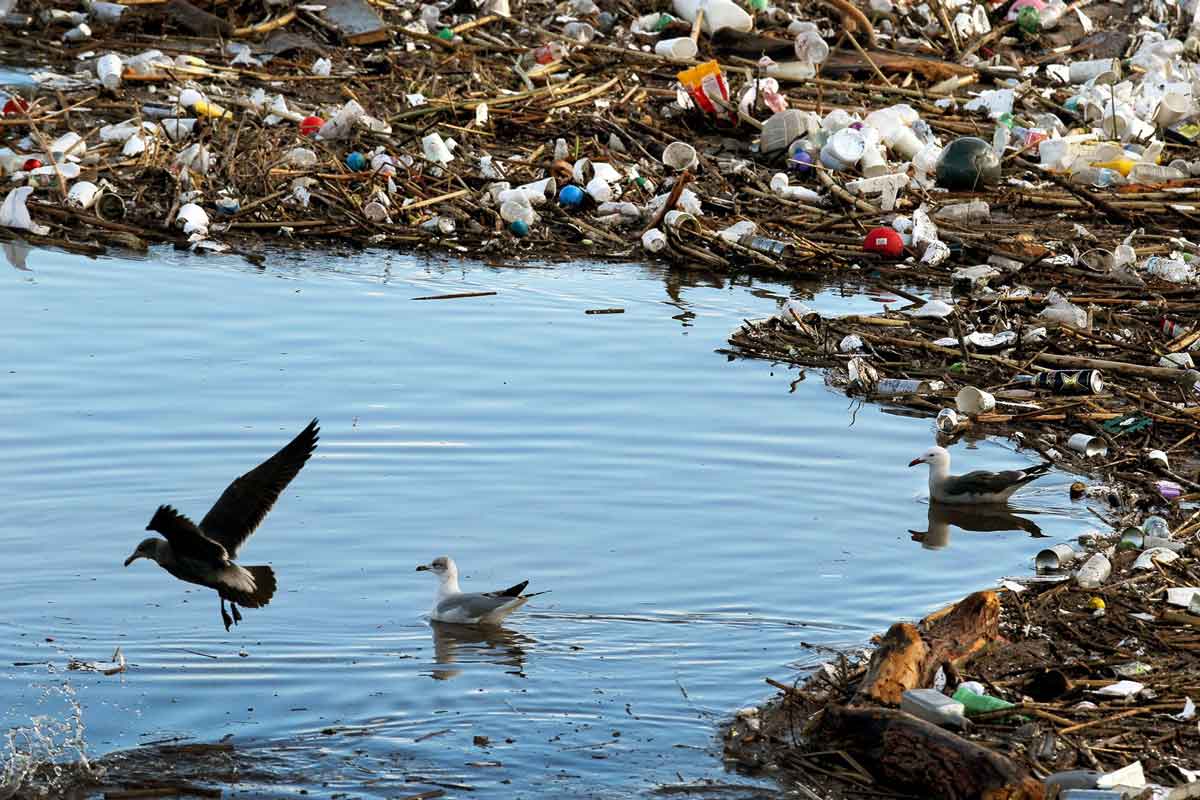SACRAMENTO--Acknowledging the worldwide environmental devastation and health problems wrought by plastic and non-recycled trash, both houses of the California State Legislature have now approved identical first-of-their-kind measures to dramatically reduce plastic and packaging waste and jumpstart the in-state clean recycling economy.
Senate Bill 54 (Allen) and Assembly Bill 1080 (Gonzalez), together known as the California Circular Economy and Plastic Pollution Reduction Act, attack the trash crisis at both ends -- both before a product is ever created or purchased, and after a single-use item is ready for disposal. The measures help businesses transition from single-use plastic containers to reusable or compostable packaging with reasonable timelines to make changes in order to achieve an overall reduction of 75 percent by the year 2030. The measures also call for incentives for in-state manufacturing using recycled materials. Together, these requirements will cut back on the amount and type of trash going into landfills and litter in neighborhoods, waterways, and the ocean, which will reduce costs to taxpayers for disposal and clean-up.
By increasing recycling rates and incentivizing the in-state manufacture of goods using recycled materials, the Act will end California’s existing reliance on other countries to take its waste, and it will boost the state economy. Currently, California waste and recycling industries are struggling to adapt to China’s 2017 “National Sword” policy to stop accepting other nations’ trash. This has resulted in Californians’ garbage and recyclables piling up at local waste facilities, going into landfills, or being shipped to other countries in Asia that cannot process the sheer amount of trash coming to them. California’s local governments -- and, therefore, ratepayers -- are experiencing increased costs as a result. But if fully implemented, the Act’s 75 percent recycling rate will not only help reduce California’s need to ship meaningful quantities of waste out-of-state, it is expected to double the existing 125,000 California jobs in recycling and manufacturing.
Plastic and single-use packaging contribute to a variety of environmental ills. As plastic breaks down in the environment, it becomes microplastic particles that leach chemicals into waterways and ocean environments, or is eaten by wildlife and marine creatures. Further, single-use items don’t simply cause pollution; they also contribute to the climate crisis. Plastic items, in particular, are derived from fossil fuels and emit greenhouse gases as they break down. Reducing California’s reliance on these items is critical for the state to meet its climate and waste diversion commitments.
Plastic and single-use items also contaminate drinking water sources, food supplies, and even air. Human exposure to plastic and its associated toxins has been linked to cancers, birth defects, impaired immunity, endocrine disruption and other serious health problems.
The measures are supported by a broad coalition of environmental organizations, health advocates, green businesses, local governments, and labor. AB 1080 now goes to the State Senate, while SB 54 heads to the State Assembly.
For more information about the measures, see the bill text or view the fact sheet here.
What others are saying about the California Circular Economy and Plastic Pollution Reduction Act:
Senator Scott Wiener (D-San Francisco), joint author of SB 54 and co-author of companion measure AB 1080: “We need to phase out single-use plastics as quickly as possible. These plastics are ruining entire ecosystems, poisoning our oceans and waterways, and killing wildlife. It’s time to transition to better alternatives and to send a powerful signal to industry to innovate and to create more sustainable products.”
Assemblymember Laura Friedman (D-Glendale), joint author of AB 1080 and principal co-author of SB 54: “Our decades of overusing non-recyclable and non-compostable single-use products has set the stage for what could be one of the greatest man-made ecological and environmental crises in history. The longer we go without taking action, the higher the costs to our environment, animal life, public health, and our economy. These bills are an important step forward and a direly-needed investment in the health of our planet.”
Assemblymember Phil Ting (D-San Francisco), joint author of AB 1080: “Tossing our single-use plastics in recycling bins is no longer good enough. If we don’t step up and change our ways, there will be more plastic in our oceans than fish by 2050. California can turn an environmental crisis around with bold plastic reduction policies like this one. Companies must re-use materials they’ve already made.”
Dianna Cohen, Co-Founder and CEO, Plastic Pollution Coalition: "Plastic Pollution Coalition urges your support of this legislation to dramatically reduce plastic and packaging waste in California. It's time for California to take the next step towards Zero Waste to protect human and animal health, waterways, oceans, and our environment for years to come."
Dan Jacobson, Director, Environment California (djacobson@
Geoff Shester, California Campaign Director and Senior Scientist, Oceana: “Solving the plastics problem in our oceans will take a concerted effort from the companies that are producing and selling these materials. This legislation will create the framework desperately needed to turn the tide on our single-use plastics problem. We applaud these state leaders and urge that these bills remain strong in their commitment to meaningfully and drastically reduce the impacts of single-use products. As the fifth-largest economy in the world, California has the opportunity to remain an environmental leader on responsible plastics policy and inspire national and international change.”
Stiv Wilson, Campaigns Director, The Story of Stuff Project (Stiv@storyofstuff.org): “This represents California drawing a line in the sand on plastic pollution. As plastic production skyrockets, we're witnessing the growing environmental and financial cost of attempting to manage the unmanageable. Without a policy like this, we won't address the scale of the problem. This is California making a quantum leap in the fight against plastic pollution.”
Kathryn Phillips, Director, Sierra Club California (kathryn.phillips@sierraclub.
Katherine O’Dea, Executive Director, Save Our Shores (katherine@saveourshores.org): “Comprehensive legislation like this is exactly what is needed to address the plastic pollution crisis we have reached. The framework it puts in place provides the kind of flexibility that is required to address various single use packaging formats and some of the most ubiquitous plastic products with a best approach for each. At the same time, the legislation mandates significant source reduction while driving recycling rates to levels we should have been able to achieve voluntarily but have failed to for decades. Save Our Shores applauds our state legislators for taking bold action.”
Shilpi Chhotray, Senior Communications Officer, Break Free From Plastic (shilpi@breakfreefromplastic.
Christopher Chin, Executive Director, The Center for Oceanic Awareness, Research, and Education (COARE) (media@coare.org): “Waste management is an important part of the conversation, but it cannot effectively address the deluge of plastic pollution we all face. We cannot recycle our way out of this problem, and it is imperative that we, as a society, support upstream solutions considering the full lifecycle of plastics - including its production and consumption. This legislation begins providing the framework for an approach that the world wants, and that the world so desperately needs.”
Sophie Haddad, State Board Chair, CALPIRG Students (shaddad@ucsd.edu): "As students and young people, we are the generation who will have to face the worst levels of ocean pollution. We know that if we don't act now, our environment will be even more devastated by trash. We have to do everything we can to stop using single-use plastics, and SB 54 and AB 1080 are great steps in the right direction."
Marce Gutiérrez-Graudiņš, Founder and Executive Director - AZUL (media@azul.org): "From production to disposal, single-use plastic and packaging waste negatively affect humans, wildlife and the environment, with a disproportionate impact on marginalized communities. This legislation is a strong step towards remedying this environmental justice crisis. Mil Gracias to supporting legislators for their strong leadership!"
Heidi Sanborn, Executive Director of National Stewardship Action Council (heidi@nsaction.us): “Producers of wasteful single-use products need to rethink their design and share in the responsibility for those end of life costs previously externalized onto the public sector and the environment do achieve a circular economy. We need well-designed durable, reusable products and the product producers are the only ones who can change that and why we support SB 54/AB 1080.”
Angela Howe, Legal Director, Surfrider Foundation (ahowe@surfrider.org): “Surfrider Foundation stands in strong support of the Plastic Pollution Reduction Act, which will help Californians rise above plastics and begin to free our ocean of the plague of plastic pollution. We applaud the state legislature for taking this critical step to usher in forward thinking policy and pave the way toward zero waste.”
Anu Natarajan, Legislative Affairs Manager, Stopwaste (ANatarajan@stopwaste.org): “StopWaste is pleased to support SB 54 and AB 1080 because these bills constitute meaningful progress toward managing packaging and plastic waste, which are both among StopWaste’s top priorities.”
Nick Lapis, Director of Advocacy, Californians Against Waste (nicklapis@cawrecycles.org): “These monumental bipartisan votes on SB 54 and AB 1080 show that California will continue to lead on tackling environmental pollution that our federal government actively ignores. We simply can’t continue to trash our planet.”
Contact: Arianna Smith
arianna@ariannazsmith.com
916.542.8303




